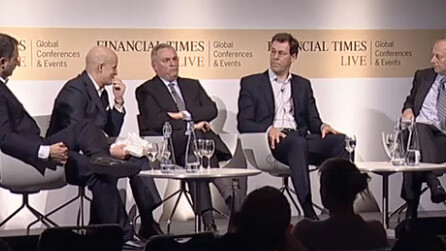
Internet giant Amazon is creating a ‘locked’ silo which users can’t escape, according to a panel of publishing industry heads.
Amazon was apparently invited to join this particular panel discussion at the Financial Times’ (FT) Digital Media Conference today, according to the FT’s West Coast Editor Richard Waters who was moderating the session, but alas the digital behemoth evidently chose not to participate.
The E-book (R)evolution sought to analyze the book publishing industry and look at its “dramatic digital shift”, with e-book sales and related ventures on the rise. Amazon was a notable gap in the line-up, but there was nonetheless a pretty solid entourage of influencers from within the industry.
Up for the debate were Santiago de la Mora, Partnerships Lead EMEA at Google Book Search; Matteo Berlucchi, CEO at aNobii; Tim Hely Hutchinson, Group Chief Executive at Hachette UK; and Michael Serbinis, CEO at Kobo.
While Amazon may not have been there in body, it was certainly there in spirit, as its dominance in the digital book space was too obvious not to mention.
Locked silo
When asked whether Amazon was an enemy to the industry, this kicked the panel into life. “They’re certainly not an enemy as far as we’re concerned,” says Hutchinson from the UK arm of French publisher Hachette. “I take my hat off to Amazon for the excellence of its strategy, the size of its investment and the service it gives to readers. But having any big corporation dominating an industry is naturally of concern to all the other players, though if Amazon does it better than other people, then good luck to them.”
Berlucchi, from the ‘social network for readers’ aNobii, weighed in with his views on the ‘closed’ nature of Amazon, saying that it’s fantastic at what it does, but there are fundamental issues. “The problem is that consumers don’t realize that when they join the Kindle platform, they’re actually locked in,” he says. “Amazon is creating a very large silo which you can’t get out of. You cannot leave the Kindle platform with your books. You’re stuck in the Amazon ‘jungle’.”

Whilst Amazon’s Kindle locks readers’ in, Serbinis from competing eReader Kobo noted that its books are ‘open’ and can be taken to other platforms if the users so wishes. Indeed, an underlying sense of anti-Amazon resentment permeated the discussion, though never really got out of hand. And Google’s de la Mora was well versed in avoiding controversy and he opted out of commenting on Amazon, choosing to plug his own Google Play service instead.
The debate will rage on for years though. Is it the big corporate behemoths come along to beat the ‘little’ guys out of business? Or is it simply creating a fertile, competitive landscape? Whichever way you see it, money certainly talks.
“The new reality of the book marketplace is that new people have come in to it…and in almost every way they’re incredibly welcome – be it Google and Apple and Amazon – into the industry,” added Hutchinson. “But they are all giant corporations, and they have very deep pockets. They have agendas other than simply selling books on behalf of authors to consumers. In some cases they want to sell hardware, or drive people to buy clothing or cameras. What publishers have been concerned about is that people [companies] with very deep pockets should not wipe out the whole dedicated book trade.”
Get the TNW newsletter
Get the most important tech news in your inbox each week.





